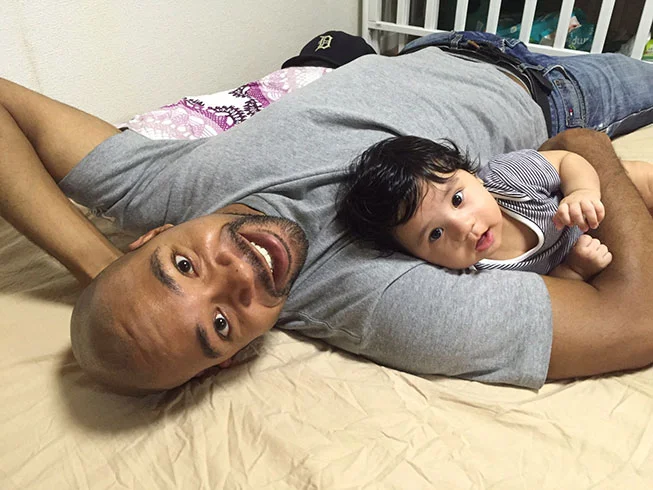by Michelle “Ms. Geek” Klein-Hass
Chuck Johnson arrived in Japan with a desire to become a stuntman in Asian martial arts cinema, and with a love of the cultures of the region. Since 2004, when he started his stunt career on an auspicious note as a stunt extra on one of the long running Godzilla series of Kaiju movies, Final Wars, he’s been busy as a stuntman, model, actor, stunt coordinator, fight director and producer.
He was also our Dojo Master for TOKYOPOP’s web series The Dojo, where Asian Pop Culture would fight it out with audience votes. He even is the “face” of an instant curry mix called Gachi Muchi, made by Village Vanguard.
Johnson has two projects to talk about here, the comedy/martial arts short film Fists Of Absinthe done for YouTube Space and Toei, Ltd; and Eastbound Traffic, a dramatic film funded by the Dutch Film Commission. Both were shot in Japan, one a fanciful tale of time travel, the other a gritty crime story. I have to thank Johnson for his candid and thoughtful answers to my questions.
TP: What drew you to the Asian Martial Arts? Was it a love of Asian traditional culture, Asian pop culture, or the martial arts itself?
CJ: I've been obsessed with martial arts and knowing everything there is to know about fighting since I first discovered Jackie Chan movies at about 12 years old. I used to sit in front of the TV and rewind tapes manually in the VCR so I could watch how certain moves were done over and over and then copy them. I even started stretching every day so I could get a full split in every direction. Looking back I think it's because as a little kid growing up in Detroit, I was picked on and bullied... and even after we moved out of Detroit, I was still picked on racially sometimes, so I think on some subconscious level, martial arts was a way to get the strength that I didn't have... because in the movies, even the little guys could always win ;)
When I was in high school, my best friend was Korean, so he suggested I do Taekwondo with him. Because I could already do the splits and had taught myself how to kick, I took to it really quickly. I became a state champion only 6 days after getting my black belt. It was the first time I was ever good at something, and from then on I was hooked, and wanted to go to the Olympics. My best friend went to Korea to train in taekwondo, so I followed suite by way of Michigan State University's study abroad program. That way I could learn Korean culture and language as well. That was how I came to Asia. And even now living in Japan, hearing Korean and seeing Korean faces still has a certain feeling of "warmth" for me.
TP: Tell us a bit about your early stuntman days. Was it hard to get the respect of your colleagues? CJ: In the beginning it was pretty tough, because I didn't speak a word of Japanese, and most Japanese stuntmen don't speak English. All I knew of Asia was Korea, and that was a different country, culture, language, etc. That and, I had come from a real martial arts background, and in a lot of ways it's actually harder for real martial artists to do stunt fighting because it means "emptying your cup" to learn how to move for a camera, and think outside of your own fighting style background. A lot of guys just can't do it well, so some fight choreographers prefer gymnasts or dancers who they can teach to kick and punch. I had to spend tons and tons of time learning a lot of different martial arts and eventually just invested the money in going to a stunt school in the states, so I could learn the logic in English. I also started bouncing back and forth to do programs and seminars through the Society of American Fight Directors. With that, I started to not just understand the logic of the fight chroeography, but know the difference between how things were done here in Asia, and in the west. From then on things really started to take off.
TP: What was the genesis of your newest project, Fists of Absinthe? What inspired this short?
CJ: Fists of Absinthe was inspired by a certain character from Japanese history called "Yasuke". There isn't much known about him, but common consensus was that he came to Japan as a slave or indentured servant of a Jesuit priest in the late 1500s. Nobunaga took a particular interest in him, and eventually freed him, and made him a Samurai. Since hearing about Yasuke, I've already wanted to play him in one way or another; there were a few Japanese reinactment dramas about him, and even though I've been studying Samurai-style theatrical sword-fighting (Ta-te) for years, I could never get the role because my skin was too light-colored. (Yasuke was really dark). As a Youtuber who's been utilizing Tokyo's Youtube studio for years, when the project partnership with Toei came up, I finally saw an opportunity to do something with it... But with the resources I had available, (the green screen, locations in present day Tokyo, etc) exploring it as a time-slip comedy just made all the more sense. Actually, there was a line in the script, where my character says "Call me Yasuke", but I just forgot to re-write it in newer versions of the script, and didn't think of it again until we were already in post-production.
(Writer's note: Yasuke was also the inspiration for the character Afro Samurai.)
TP: Is there a possibility Fists of Absinthe might be redone as a feature?
CJ: I am really hoping to do Fists of Absinthe again as a feature. There was quite a lot to the story, and I would love to tell the full story. Beyond that, I think the action that was used was more or less just a hint of what we could really do. I would really love to expand that out even further and take it to a whole 'nother level. I'm working hard to get the financing so let's keep our fingers crossed ;)
TP: When you are in the US, what do you miss about Japan?
CJ: Whenever I come back to the states, there's a lot I miss about Japan. How incredibly clean and safe it is everywhere, the healthcare system, how polite and modest everyone is, how easy it is to be healthy because of the style of food and small portion sizes, etc. Of course life here has it's struggles too, but Japan is really a wonderfully amazing place to live. Especially in Tokyo because it's such a megapolis. Culturally, I also miss how good everyone is at reading between the lines. With most Japanese people, you rarely have to say anything strongly for people to understand how you feel or where you are coming from.
TP: When you are in Japan, what do you miss about the US?
CJ: Conversely when I am in Japan, the big things I miss about the states are huge meat lovers pizzas, crispy North American bacon (Japanese bacon is more like ham), and how easy it is to communicate with people. Americans are really open, outgoing and creative, and up for sharing ideas. While most folks in Japan are really really good at reading people, the downside is also that most people are also really shy, and they don't express themselves much. That makes it harder to get to know people and understand them. Americans are so easy to talk to. Even when we get heated about political debates, at the end of the day, we still communicate with each other, and that communication solves problems and moves society forward. Japan is always growing too, but I think a bit more open and direct communication could expediate the process more. As with the states, at the end of the day, it's all about finding balances.
TP: Many have commented on Japan's problems with people of other ethnicities, particularly in the wake of Ariana Minamoto's experiences as a Hafu winning Miss Universe Japan. What has your experience been as a Black man in Japan?
CJ: Like anywhere else, Japan has it's racial issues. Particularly with China and Korea. And as an American here, of course those issues extend to me to, and eventually my family. My wife and I have been turned down for housing and apartments simply because I am a foreigner; before they even ask where I am from, what I do, or how much money I have. Same goes with the guys on my stunt team. (Who are Canadian and British). As my son is also obviously half-black, and I know what it feels like to be picked on racially, I also have to worry about him dealing with it. I have to teach him to be strong and tough enough to take it and overcome. I also want to show him that if you carry yourself with politeness, respect and dignity, and you always try to be a good person, people will always come to respect you. I want to show my son the pen is always mightier than the sword, and that positivity always wins; regardless of where you live.
Ty Johnson and his daddy
TP: Let's end this with a look at your other recent project, Eastbound Traffic. What's the story on that?
CJ: Eastbound Traffic was a story that was inspired by my experiences working in the underbelly of Japan's sex industry. Early on in my career here, I needed work that would leave my schedule open during the day so I could go my fight choreography training, not speaking much Japanese, my options were limited, so at the suggestion of a friend because of my build, I started working as a stripper. While doing the job I met a ton of women who were brought over by means of sex trafficking, and spent a lot of time listening to the things they were going through. This was all before Facebook and Twitter, and I only knew their first names, so if they disappeared, there was no way to know what happened to them. Eastbound Traffic was my way to tell their stories, and some of the things characters say in the story were based off of conversations I actually heard or witnessed. It was funded by the Dutch film commission, as an international collaboration, so we had a Dutch/Japanese crew. The project has hit some snags in post-production, but is finally moving forward again, so we hope to release it at the end of this year.









